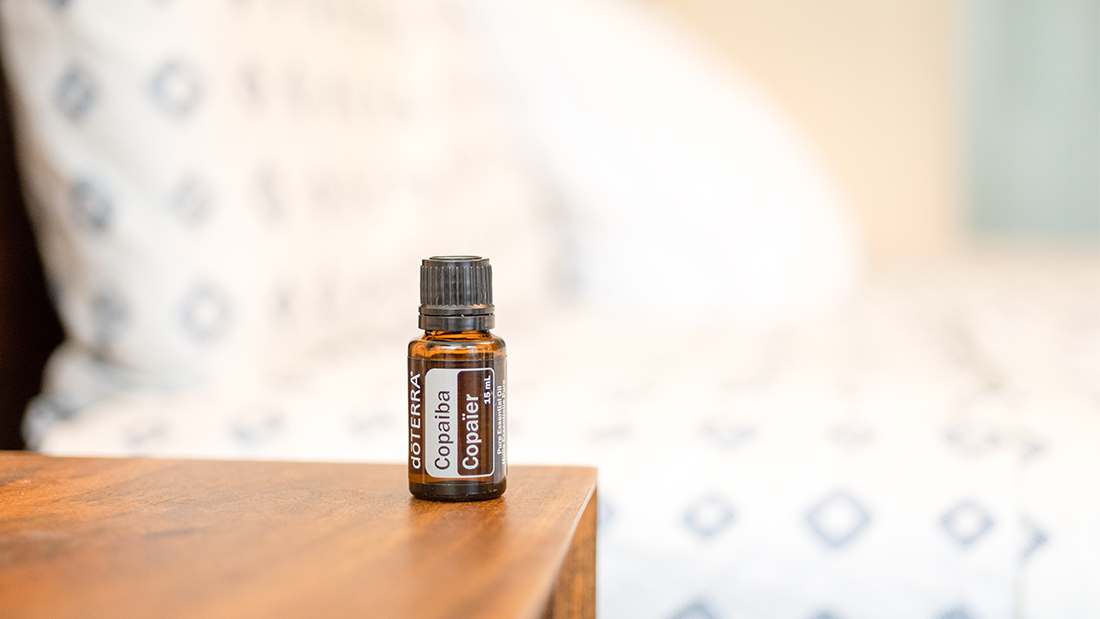Origin: a Latin derivative
meaning "Gift of the Earth."
Copaiba Oil Uses and Benefits

Copaiba Oil Product Description
An exceptional member of the resin essential oil family, Copaiba oil is extracted from copaiba trees in the Amazon rainforest. Copaiba oil is an incredibly versatile oil that has been used for centuries. Today, Copaiba essential oil is widely used in cosmetic products including soaps, creams, lotions, and perfumes, for both its pleasant woody aroma and its profound benefits to the skin. Copaiba essential oil can also be used orally to effectively cleanse the mouth and the gums.
With its warm, woody aroma and incredible skin soothing benefits, it’s no wonder that Copaiba is a fan-favourite essential oil. The good just got better because doTERRA Touch® Copaiba has everything you love about Copaiba essential oil, available in a convenient 10 mL roll-on. Because it’s diluted with Fractionated Coconut Oil, doTERRA Touch Copaiba is an ideal option for those with skin sensitivities.
Shop Copaiba Oil Shop doTERRA Touch Copaiba
How do I use Copaiba oil?
- Skincare: Copaiba essential oil gently cleanses, soothes, and moisturizes the skin when used topically. To keep your complexion clear and healthy looking, add a drop of Copaiba oil to your facial toner or apply doTERRA Touch Copaiba directly to your skin before moisturizing.
- Moisturizer: Add one or two drops of Copaiba oil to an unscented lotion of your choice (try doTERRA® SPA Hand & Body Lotion) and massage into your hands and skin for a boosted moisturizing effect.
- Foot Soak: Capture the skin-soothing benefits of Copaiba oil by adding two drops to a bowl of hot water with Epsom salts for a rejuvenating aroma as part of a foot soak. For an especially luxurious experience, try this recipe for DIY Foot Fizzies with Copaiba oil.
- Personal Aroma: Use Copaiba oil as a personal fragrance by applying doTERRA Touch Copaiba to your inner wrists and neck. Alternatively, blend Copaiba essential oil with oils that complement its earthy aroma such as Roman Chamomile oil, Cedarwood oil, Frankincense oil, or Ylang Ylang oil. Combine in a roller bottle, fill the rest of the bottle with Fractionated Coconut Oil, and apply as a unique, naturally sourced perfume.
- Bath Aroma: Give yourself the royal self-care treatment by using Copaiba oil in a calming bath. Add two to three drops to your bath water or combine with your bath gel of choice before lathering it in the water.
- Diffusion: Diffuse several drops of Copaiba essential oil in a sunny room for an energizing and stabilizing aroma during meditation.
Fun Fact
The collection process of the copaiba tree’s oleoresin is unique among essential oils—it is tapped from the tree similar to how maple trees are tapped for their syrup, and then steam distilled to produce the essential oil.
What is Copaiba oil?
Copaiba essential oil is extracted from the Copaifera officinalis tree, a variety of evergreen native to Central and South America. Though it can grow in both wet and dry forests, it flourishes best in tropical rainforest habitats such as the Amazon rainforest. The trees themselves are tall, with the potential to grow to more than 100 feet. The essential oil is steam distilled from the copaiba tree’s oleoresin, a substance made up of resin and essential oils.
How is Copaiba oil sourced?
Copaiba essential oil is sourced through the doTERRA Co-Impact Sourcing initiative in the Amazon rainforest. The Amazon rainforest represents over half of the planet’s remaining rainforests, and doTERRA is proud to partner with a large network of copaiba harvesters that sustainably collect their oleoresin and ensure that the trees will be around for years to come.
What essential oils blend well with Copaiba oil?
Copaiba is a mildly woody and spicy smelling oil that blends well with a number of other essential oil aromas. Try pairing with Vetiver oil, Lavender oil, and Wild Orange oil for a restful aroma, or Peppermint oil for an invigorating scent.
Cautions
Possible skin sensitivity. Keep out of reach of children. If you are pregnant, nursing, or under a doctor’s care, consult your physician. Avoid contact with eyes, inner ears, and sensitive areas.



